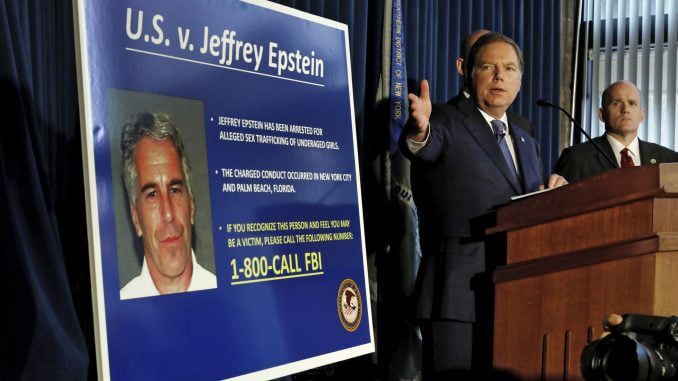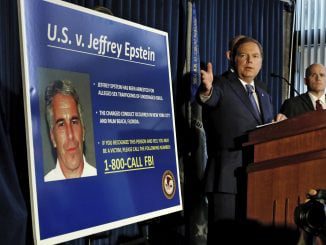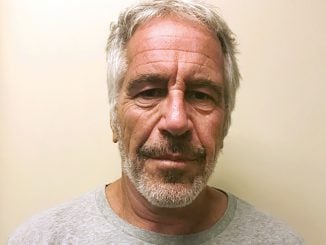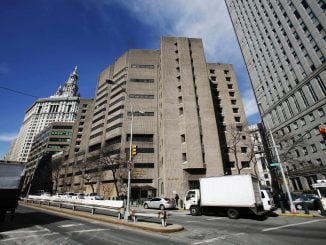
NEW YORK — Two Jeffrey Epstein accusers urged a judge Monday to keep the wealthy financier behind bars until he goes on trial on federal charges that he sexually abused underage girls.
The women stood just feet from where Epstein was seated in his blue jail outfit as they asked a federal judge to reject a request by Epstein’s lawyers that he remain under house arrest in his $77 million Manhattan mansion until trial on conspiracy and sex trafficking charges.
Courtney Wild, an unnamed victim in the 2008 lawsuit against the Department of Justice for the secret plea deal that allowed Epstein to avoid similar charges, spoke for the first time in court with a fellow accuser.
Wild said she was sexually abused by Epstein in Palm Beach, Florida, when she was 14.
“He’s a scary person to have walking the streets,” she said.
Annie Farmer said she was 16 when she met Epstein in New York. She said he later flew her to New Mexico to spend time with him there.
“He was inappropriate with me,” she said. She did not elaborate.
The Associated Press doesn’t name alleged victims of sexual abuse without their consent. Through their lawyers, both Farmer and Wild said they were willing to be publicly identified.
Judge Richard M. Berman said he’ll rule Thursday whether Epstein can be freed on bail, but he noted at the outset of a two-hour hearing there was a presumption in sex trafficking cases involving juveniles that the defendant will remain locked up.
He also rescinded his decision last week to let Epstein reveal his finances under seal, criticizing a one-page “asset summary” in which Epstein claimed $559 million in assets, including $56 million in cash, $112 million in equities, $195 million in hedge funds and private equity and $180 million in property.
Epstein seemed animated Monday, writing notes to his attorneys and leaning forward with his hands folded. He looked directly at each of his accusers before they spoke.
Assistant U.S. Attorney Alex Rossmiller said the government’s case is “getting stronger every single day” since Epstein was arrested July 6 as he arrived at a New Jersey airport from Paris on his private plane.
During a raid at Epstein’s Manhattan mansion following his arrest, Rossmiller said, investigators found “piles of cash,” ”dozens of diamonds” and an expired passport with Epstein’s picture and a fake name in a locked safe.
“How many safes are there in so many other locations like these?” Rossmiller asked.
He called the well-connected Epstein, 66, a flight risk and a danger to the community, saying he should remain incarcerated until he is tried on charges that he recruited and abused dozens of underage girls in New York and Florida in the early 2000s.
Epstein’s lawyer, Martin Weinberg, said his client has not committed crimes since pleading guilty to charges of soliciting a minor for prostitution in Florida in 2008 and that the federal government is reneging on a 12-year-old plea deal not to prosecute him.
Epstein had demonstrated that he “disciplined himself,” Weinberg said, by not engaging in any crimes since the Florida deal, in which he agreed to submit himself to sex offender registration procedures in multiple states.
The “14-year gap is an elegant rebuttal” to expectations that he would re-offend, Weinberg said. “It’s not like he’s an out-of-control rapist.”
But the judge later noted he had read literature related to sex offenders that indicated the chance of a sex offender committing a new crime grew over time.
Prior to Monday’s hearing, prosecutors said in court papers that additional women in multiple jurisdictions had told the government they were abused as minors by Epstein since his arrest.
Prosecutors said they believe Epstein might have tried to influence witnesses after discovering that he had paid a total of $350,000 to two individuals, including a former employee, in the last year. That came after the Miami Herald reported the circumstances of his state court conviction in 2008, which led to a 13-month jail term and his deal to avoid federal prosecution.
Weinberg defended the payouts, saying sending money to an employee or a friend “is simply not witness tampering.” He added that even if his client knew scrutiny was intensifying of his behavior in the early 2000s, he never tried to leave the country, although he now considers his primary residence the Virgin Islands.
Rossmiller, though, said prosecutors went to great lengths to ensure no word leaked out about their months-long investigation because they feared he would flee. “He is in a grave position, and he has every motive and means to flee,” the prosecutor said.




